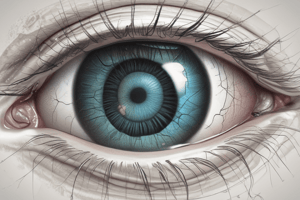Podcast
Questions and Answers
What will a pure blue object appear as when illuminated by pure red light?
What will a pure blue object appear as when illuminated by pure red light?
- Black (correct)
- Purple
- Blue
- Red
What is color constancy?
What is color constancy?
- The process of mixing colors to create new hues
- The ability to see color despite changes in light sources (correct)
- The perception of color based on surface texture
- The ability to perceive the brightness of colors
Which of the following factors is least involved in the eye-brain color-sensing system?
Which of the following factors is least involved in the eye-brain color-sensing system?
- Nerve connections among light receptors
- Sensitivity to edges
- Comparison among various objects
- Processing occurring in the brain only (correct)
How does the eye enhance visual information according to the content?
How does the eye enhance visual information according to the content?
What is the primary mechanism that the eye uses to adjust for different distances of objects?
What is the primary mechanism that the eye uses to adjust for different distances of objects?
What principle did Edwin Land propose regarding color perception?
What principle did Edwin Land propose regarding color perception?
Under what condition can color perception of an object change?
Under what condition can color perception of an object change?
What condition results when the eye over converges rays from distant objects?
What condition results when the eye over converges rays from distant objects?
In what way does the eye handle variations in light entering it?
In what way does the eye handle variations in light entering it?
Which statement correctly describes the vision capabilities of a person with normal vision?
Which statement correctly describes the vision capabilities of a person with normal vision?
What describes the eye's state when viewing distant objects?
What describes the eye's state when viewing distant objects?
What effect does a pure red light have on a white object?
What effect does a pure red light have on a white object?
What is the far point of the eye?
What is the far point of the eye?
How does a farsighted eye differ in its ability to focus on close objects?
How does a farsighted eye differ in its ability to focus on close objects?
What physical change occurs in the lens for close vision?
What physical change occurs in the lens for close vision?
What is meant by 'accommodated vision'?
What is meant by 'accommodated vision'?
What is the primary function of rods in the human retina?
What is the primary function of rods in the human retina?
Where in the eye are cones most densely concentrated?
Where in the eye are cones most densely concentrated?
Which type of correction is specifically used to address astigmatism?
Which type of correction is specifically used to address astigmatism?
How many types of cones are there in the human retina, and what is their role?
How many types of cones are there in the human retina, and what is their role?
What is considered a major advantage of contact lenses over glasses?
What is considered a major advantage of contact lenses over glasses?
What misconception does the simple theory of color vision suggest about the primary colors?
What misconception does the simple theory of color vision suggest about the primary colors?
Which of the following statements is TRUE about the effect of lasers in vision correction?
Which of the following statements is TRUE about the effect of lasers in vision correction?
What does the presence of various combinations producing the same hue indicate about color perception?
What does the presence of various combinations producing the same hue indicate about color perception?
What is the primary reason color vision diminishes in dark environments?
What is the primary reason color vision diminishes in dark environments?
What percentage of patients typically achieve normal distant vision after LASIK treatment?
What percentage of patients typically achieve normal distant vision after LASIK treatment?
What is the primary purpose of the cylindrical correction in eyeglasses?
What is the primary purpose of the cylindrical correction in eyeglasses?
What does RGB stand for in the context of color television?
What does RGB stand for in the context of color television?
What is the role of the fovea in color vision?
What is the role of the fovea in color vision?
Which of the following accurately describes the role of the cornea in vision?
Which of the following accurately describes the role of the cornea in vision?
What characteristic of lasers makes them suitable for precise corneal reshaping in vision correction?
What characteristic of lasers makes them suitable for precise corneal reshaping in vision correction?
Which refractive error can LASIK effectively treat along with nearsightedness and farsightedness?
Which refractive error can LASIK effectively treat along with nearsightedness and farsightedness?
What is the primary function of the cornea in the human eye?
What is the primary function of the cornea in the human eye?
How does the eye achieve the adjustment of focus for objects at different distances?
How does the eye achieve the adjustment of focus for objects at different distances?
What is the significance of the fovea in the human eye?
What is the significance of the fovea in the human eye?
What happens to the image formed by the eye before it is perceived by the brain?
What happens to the image formed by the eye before it is perceived by the brain?
What role do refractive indices play in vision?
What role do refractive indices play in vision?
Which structure in the eye significantly contributes to the initial bending of light rays?
Which structure in the eye significantly contributes to the initial bending of light rays?
What is necessary for clear vision in terms of image placement within the eye?
What is necessary for clear vision in terms of image placement within the eye?
Which statement about normal vision correction is accurate?
Which statement about normal vision correction is accurate?
What is the primary reason for using a diverging lens to correct myopia?
What is the primary reason for using a diverging lens to correct myopia?
How does the correction for hyperopia differ from myopia?
How does the correction for hyperopia differ from myopia?
What determines the spectacle power needed for correcting nearsightedness?
What determines the spectacle power needed for correcting nearsightedness?
What condition is characterized by asymmetry in the focus of the eye?
What condition is characterized by asymmetry in the focus of the eye?
What is the near point of the eye normally considered to be?
What is the near point of the eye normally considered to be?
Which statement about wearing corrective lenses is true?
Which statement about wearing corrective lenses is true?
What causes the blurred vision experienced in astigmatism?
What causes the blurred vision experienced in astigmatism?
How is the image produced by a spectacle lens determined for a farsighted individual?
How is the image produced by a spectacle lens determined for a farsighted individual?
Flashcards
Near Point
Near Point
The closest distance an eye can see clearly. Typically 25cm for normal vision.
Myopia
Myopia
Nearsightedness; ability to see distant objects clearly but not close objects. Caused by the eye being too long or lens being too strong.
Hyperopia
Hyperopia
Farsightedness; ability to see nearby objects clearly but not distant objects. Caused by the eye being too short or lens being too weak.
Diverging Lens
Diverging Lens
Signup and view all the flashcards
Converging Lens
Converging Lens
Signup and view all the flashcards
Far Point
Far Point
Signup and view all the flashcards
Astigmatism
Astigmatism
Signup and view all the flashcards
Accommodation
Accommodation
Signup and view all the flashcards
Ciliary muscle
Ciliary muscle
Signup and view all the flashcards
Nearsightedness (Myopia)
Nearsightedness (Myopia)
Signup and view all the flashcards
Farsightedness (Hyperopia)
Farsightedness (Hyperopia)
Signup and view all the flashcards
Lens-to-retina distance
Lens-to-retina distance
Signup and view all the flashcards
Power (of a lens)
Power (of a lens)
Signup and view all the flashcards
Focal length (of a lens)
Focal length (of a lens)
Signup and view all the flashcards
Enabling Science
Enabling Science
Signup and view all the flashcards
Human Eye's Functioning
Human Eye's Functioning
Signup and view all the flashcards
Fovea
Fovea
Signup and view all the flashcards
Eye's Adaptability
Eye's Adaptability
Signup and view all the flashcards
Optic Nerve Function
Optic Nerve Function
Signup and view all the flashcards
Refractive Index in Eye
Refractive Index in Eye
Signup and view all the flashcards
Lens's Role in Vision
Lens's Role in Vision
Signup and view all the flashcards
Inverted Images in Eye
Inverted Images in Eye
Signup and view all the flashcards
What are the two basic questions addressed in the text?
What are the two basic questions addressed in the text?
Signup and view all the flashcards
Rods
Rods
Signup and view all the flashcards
What are the three primary colors in a simplified theory of color vision?
What are the three primary colors in a simplified theory of color vision?
Signup and view all the flashcards
True Color
True Color
Signup and view all the flashcards
How many rods and cones are estimated to be in the human retina?
How many rods and cones are estimated to be in the human retina?
Signup and view all the flashcards
What is the difference between rods and cones in terms of their location in the retina?
What is the difference between rods and cones in terms of their location in the retina?
Signup and view all the flashcards
Astigmatism Correction
Astigmatism Correction
Signup and view all the flashcards
Spherical Correction
Spherical Correction
Signup and view all the flashcards
Contact Lenses: Advantages
Contact Lenses: Advantages
Signup and view all the flashcards
LASIK Procedure
LASIK Procedure
Signup and view all the flashcards
Laser Vision Correction: Benefits
Laser Vision Correction: Benefits
Signup and view all the flashcards
Cornea's Role in Vision
Cornea's Role in Vision
Signup and view all the flashcards
Power of Multiple Lenses
Power of Multiple Lenses
Signup and view all the flashcards
Color Constancy
Color Constancy
Signup and view all the flashcards
Retinexes
Retinexes
Signup and view all the flashcards
How does color constancy work?
How does color constancy work?
Signup and view all the flashcards
Why does a blue object appear black under red light?
Why does a blue object appear black under red light?
Signup and view all the flashcards
What does it mean that 'the eye actively processes visual information'?
What does it mean that 'the eye actively processes visual information'?
Signup and view all the flashcards
What are the key features of Land's retinex theory?
What are the key features of Land's retinex theory?
Signup and view all the flashcards
What is the role of signal processing in color vision?
What is the role of signal processing in color vision?
Signup and view all the flashcards
What is the relationship between the number of receptors and nerve connections in the eye?
What is the relationship between the number of receptors and nerve connections in the eye?
Signup and view all the flashcards
Study Notes
Chapter 26: Vision
- Physics is called an enabling science, enabling development and advancement in other areas, particularly in biosciences, through optics and imaging.
- The human eye is remarkable in its ability to form images and detect detail and color. However, commonly needs some correction to reach ideal vision.
- The cornea and lens function as a single thin lens to form images on the retina.
- For clear vision, an image must be projected onto the light-sensitive retina, which is a fixed distance from the lens.
- The lens adjusts its power to focus objects at varying distances.
- The fovea, located in the center of the macula, has the highest concentration of light receptors, providing the clearest, sharpest vision.
- Chemical adaptations and the variable pupil opening adjust to light intensity, from dim to bright.
- Visual nerve impulses are processed in the retina and then relayed to the brain via the optic nerve.
Physics of the Eye
- Key anatomical structures of the eye are identified.
- The cornea and lens act as a single thin lens.
- The eye requires corrections to reach ideal vision, rather than normal vision.
- Refractive indices are crucial to image formation using lenses.
- The cornea contributes about two-thirds of the eye's focusing power due to light speed changes from air to cornea.
- The lens provides the remaining focusing power to achieve a clear image.
- Clear vision requires the image distance to equal the lens-to-retina distance.
Accommodation
- The eye achieves its ability for objects at varying distances through a process of accommodation, varying the focal length, to appropriately focus on objects at different distances.
- A normal eye can clearly see objects ranging from 25cm to infinity.
- The eye's lens is adjusted to be more converging (shorter focal length) for nearby objects and more diverging (longer focal length) for distant objects.
Vision Correction
- Common vision defects include nearsightedness (myopia) and farsightedness (hyperopia).
- Nearsightedness: the inability to see distant objects clearly, while close objects are clear; light rays are over-converged.
- Farsightedness: the inability to see close objects clearly, while distant objects are clear; light rays under-converged.
- Astigmatism: an unevenness or asymmetry in the focus of the eye, causing elongated images.
- Corrections for nearsightedness use diverging lenses, reducing the eye's focusing power, so that the image is focused on the retina.
- Corrections for farsightedness use converging lenses to increase the eye's focusing power, properly focusing the image onto the retina.
- Contact lenses and eyeglasses correct vision by placing lenses in front of the eye to bring the image to the correct spot on the retina.
Color and Color Vision
- Objects and light emit various hues that stimulate the eyes, brain, and emotions.
- A simplified theory of color vision suggests the existence of three primary colors (RGB) that combine to produce a wide range of hues.
- The actual color of objects depends on how they absorb or reflect light, regardless of the lighting condition.
- Color constancy is the ability of the eye-brain system to perceive the true color of objects under varying lighting conditions.
- Rods and cones are light-sensing cells in the retina.
- Rods are highly sensitive to dim light and are primarily responsible for peripheral vision, while cones are sensitive to bright light and primarily responsible for color vision.
Retinex Theory
- Proposed by Edwin Land, the retinex theory explains that the brain compares images from cones, comparing them with their surroundings to determine the actual color of an object, not just based on the wavelengths entering the eye.
Mathematical Calculations
- Formulas for calculating the power and distance of the object, given various data, are presented.
Additional Information
- Modern laser vision correction techniques, like LASIK, have significantly improved precision and efficiency.
- The human visual system has the ability to process and perceive light data remarkably efficiently, with the eye performing preliminary processing before information is relayed to the brain.
Studying That Suits You
Use AI to generate personalized quizzes and flashcards to suit your learning preferences.





